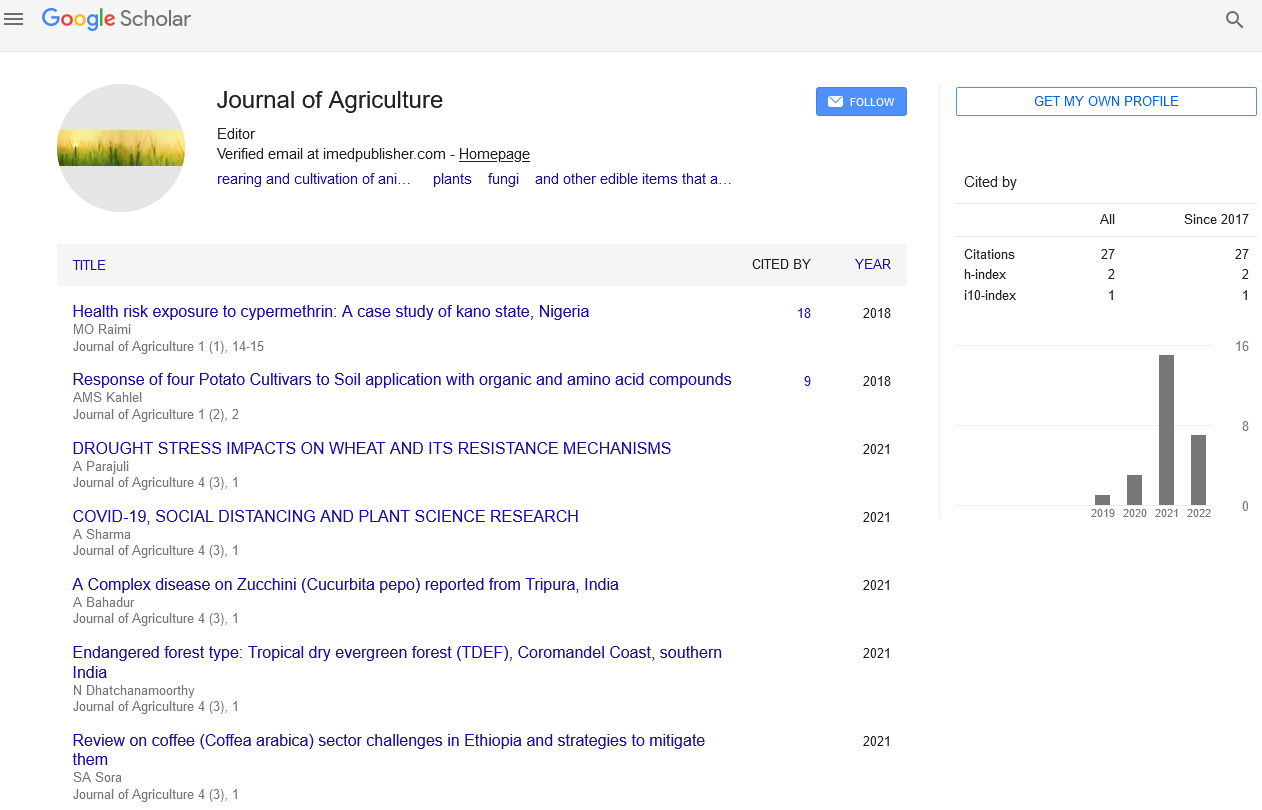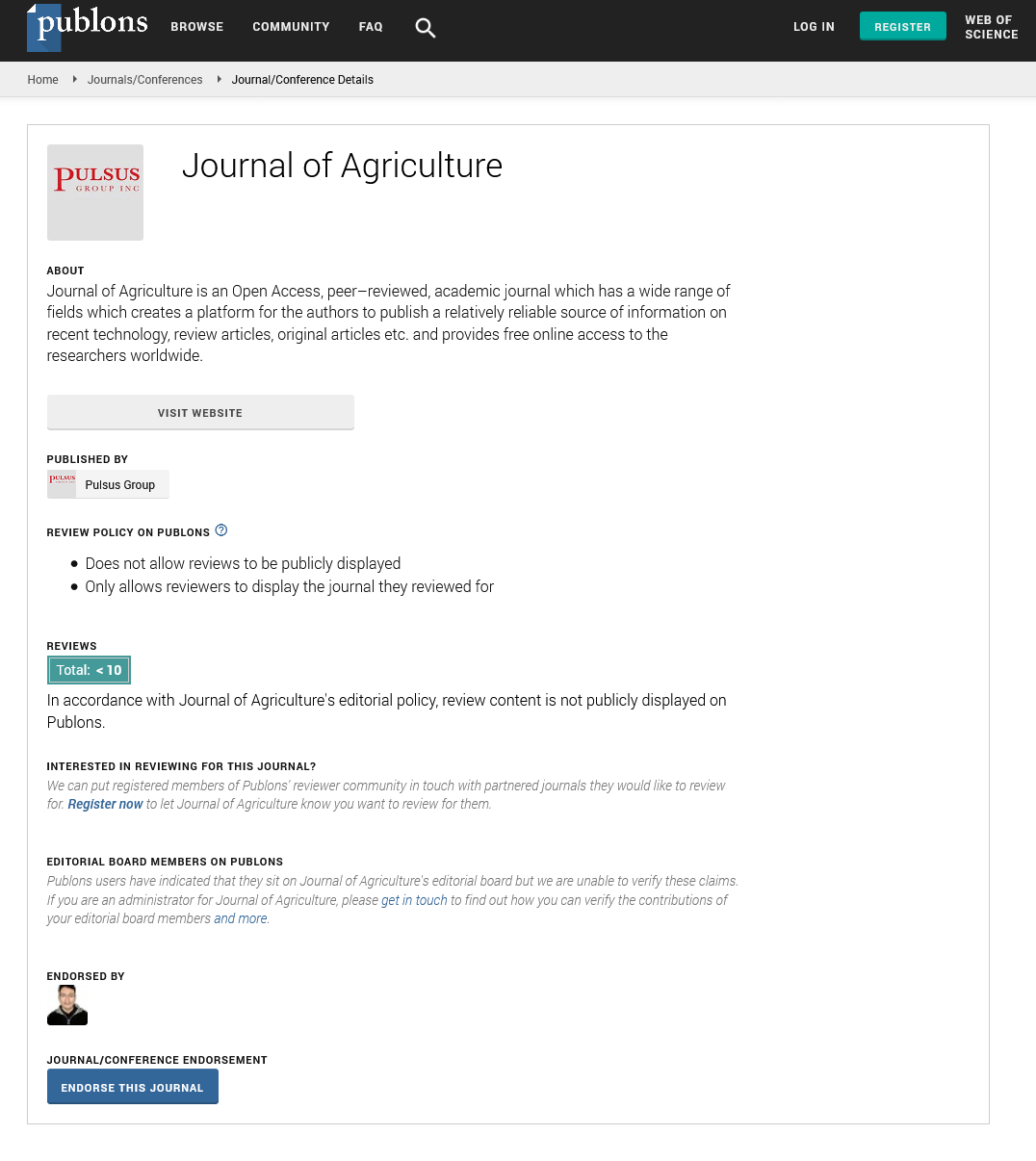Mini Review - Journal of Agriculture (2023) Volume 6, Issue 3
Farm Management: Optimizing Agricultural Operations for Success
Johon Saksena*
Department of Resource Economics and Environmental Sociology (REES), University of Alberta, Edmonton, Canada d
Department of Resource Economics and Environmental Sociology (REES), University of Alberta, Edmonton, Canada d
E-mail: Johonsaksena34@gmail.com
Received: 31-May-2023, Manuscript No. jagri-23-103206; Editor assigned: 02-Jun-2023, Pre-QC No. jagri-23-103206 (PQ); Reviewed: 16- Jun-2023, QC No. jagri-23-103206; Revised: 21-Jun-2023, Manuscript No. jagri-23-103206 (R); Published: 28-Jun-2023, DOI: 10.37532/ jagri.2023.6(3).79-81
Abstract
Farm management is a critical aspect of agricultural practices that involves the efficient utilization of resources and effective decision-making processes to maximize productivity and profitability while maintaining sustainable practices. This abstract provides an overview of farm management, highlighting its key components and the significance of adopting modern approaches in the ever-changing agricultural landscape. Effective farm management encompasses various interconnected elements, including land management, crop production, livestock management, financial planning, marketing strategies, and environmental stewardship. It requires farmers to analyse and optimize their operations to achieve optimal results. With the advancements in technology and the availability of datadriven tools, farmers can now make informed decisions based on accurate information and predictive models. Land management forms the foundation of farm management, encompassing activities such as soil analysis, crop rotation, irrigation management, and land-use planning. By implementing sustainable practices like conservation tillage, precision agriculture techniques, and the use of cover crops, farmers can improve soil health, reduce erosion, conserve water resources, and enhance overall land productivity. Crop production entails selecting appropriate crop varieties, determining optimal planting and harvesting times, and implementing effective pest and disease control measures. Integrating precision farming technologies, such as remote sensing, drones, and GPSguided machinery, enables farmers to monitor crop growth, identify yield-limiting factors, and apply inputs precisely, resulting in increased efficiency and reduced resource wastage. Livestock management involves the proper care, nutrition, and breeding of farm animals. Effective livestock management practices focus on ensuring animal welfare, optimizing feed utilization, implementing disease prevention measures, and maintaining appropriate housing and sanitation facilities. By adopting modern techniques like genetic selection, artificial insemination, and data-driven monitoring systems, farmers can enhance livestock productivity, product quality, and overall profitability. Financial planning is an integral component of farm management, encompassing budgeting, cost analysis, risk management, and investment decision-making. Farmers need to evaluate their production costs, establish realistic revenue expectations, and develop strategies to mitigate financial risks.Access to financial tools, such as agricultural loans, insurance schemes, and commodity market information, can support farmers in making informed financial decisions and managing market volatility effectively. Marketing strategies play a crucial role in farm management, as farmers need to identify target markets, establish competitive pricing, and develop effective distribution channels. Understanding consumer preferences, market trends, and value-added opportunities allows farmers to optimize their product positioning and maximize profitability. direct marketing platforms, e-commerce channels, and community-supported agriculture initiatives offer farmers alternative avenues for reaching consumers and establishing direct connections. Environmental stewardship has become an increasingly important aspect of farm management. Sustainable agriculture practices, such as organic farming, agroforestry and resource conservation, help minimize negative environmental impacts, preserve biodiversity, and maintain ecosystem health. By adopting climate-smart practices, such as water and energy efficiency, carbon sequestration, and greenhouse gas reduction measures, farmers contribute to mitigating climate change and creating resilient agricultural systems. Farm management encompasses a range of interconnected components that are essential for the success and sustainability of agricultural operations. By embracing modern technologies, data-driven decision-making processes, and sustainable practices, farmers can optimize their resource utilization, enhance productivity and profitability, and contribute to a more resilient and environmentally conscious agricultural sector
Keywords
Environmental stewardship • Agricultural landscape • Embracing modern technologies • Agroforestry
Introduction
Farm management plays a crucial role in ensuring the efficiency, profitability, and sustainability of agricultural operations. It involves a range of activities, including planning, organizing, implementing, and monitoring various aspects of farming to maximize productivity and mitigate risks [1]. This article provides an overview of farm management practices and strategies that can help farmers achieve long-term success.
Planning and goal setting
Successful farm management begins with strategic planning and goal setting. Farmers need to assess their resources, market conditions, and available technologies to develop a comprehensive plan for their operations. This plan should include setting realistic goals, such as increasing yields, reducing costs, diversifying crops, or adopting sustainable practices [2].
Financial management
Sound financial management is essential for the economic viability of any farm. It involves budgeting, tracking expenses, and ensuring a steady cash flow. Farmers should maintain accurate records of income and expenses, analyse profitability by crop or livestock enterprise, and make informed decisions regarding investments, loans, and insurance [3]. Utilizing financial software and seeking professional advice can be beneficial for effective financial management.
Crop and livestock management
Efficient crop and livestock management practices are critical for maximizing yields and maintaining healthy production systems. This includes selecting suitable crops or livestock breeds, implementing appropriate planting or breeding techniques, managing nutrient application and irrigation, monitoring pest and disease control, and optimizing harvesting or milking processes. Employing modern technologies, such as precision agriculture, can enhance efficiency and reduce waste [4,5].
Soil and water conservation
Sustainable farm management prioritizes soil and water conservation to maintain long-term productivity and protect the environment. Farmers can adopt conservation tillage practices, such as no-till or reduced-till methods, to minimize soil erosion and preserve soil health. Implementing efficient irrigation systems, water recycling methods, and employing measures like cover cropping and contour farming can help conserve water resources [6].
Risk management
Farming involves inherent risks such as weather fluctuations, market volatility, and crop or livestock diseases. Effective risk management strategies help farmers minimize losses and protect their investments. This can be achieved through diversification, hedging against price fluctuations, purchasing crop or livestock insurance, and staying informed about government programs or incentives related to risk management [7].
Technology adoption
The integration of technology into farm management has revolutionized modern agriculture. Farmers can benefit from using precision agriculture tools, data analytics, and remote sensing technologies to optimize input use, monitor crop growth, and make data-driven decisions [8]. Automated systems for irrigation, feeding, and monitoring livestock can enhance efficiency and reduce labor requirements.
Human resource management
Managing human resources is vital for successful farm operations. Farmers need to recruit and train skilled labor, foster a positive work environment, and ensure worker safety. Efficient labor scheduling, delegation of tasks, and implementing incentive programs can improve productivity and employee satisfaction [9].
Marketing and market analysis
Understanding market trends and consumer demands is crucial for farm profitability. Farmers should conduct market research, identify target markets, and develop effective marketing strategies. Building strong relationships with buyers, exploring niche markets, and utilizing digital platforms for marketing and e-commerce can help farmers connect with consumers and maximize profits [10].
Conclusion
Effective farm management is a multifaceted approach that requires careful planning, efficient resource allocation, and continuous adaptation to market dynamics. By employing sound management practices across various aspects of their operations, farmers can optimize productivity, profitability, and sustainability. Embracing technological advancements and staying informed about industry trends will be key in ensuring longterm success in the ever-evolving field of agriculture.
References
- Nyirenda SP, Sileshi GW, Belmain SR et al. Farmers’ ethno-ecological knowledge of vegetable pests and pesticidal plant use in Northern Malawi and Eastern Zambia. Afr J Agri Res. 6, 2 (2011).
- Bergmann EJ, Raupp MJ. Efficacies of Common Ready to Use Insecticides AgainstHalyomorpha halys(Hemiptera: Pentatomidae). Florida Entomol. 97(2), 791-800 (2014).
- Lahat G, Lazar A, Lev D et al. Sarcoma epidemiology and etiology: potential environmental and genetic factors. Surg Clin North Am. 88, 451-481 9 (2008).
- Johnson KJ, Carozza SE, Chow EJ et al. Parental age and risk of childhood cancer: a pooled analysis. Epidemiology. 20, 475-483 (2009).
- Woods JS, Polissar L, Severson RK et al. Soft tissue sarcoma and non-Hodgkin's lymphoma in relation to phenoxyherbicide and chlorinated phenol exposure in western Washington. J Natl Cancer Inst. 78, 899-910 (1987).
- Reynolds A, Mann J, Cummings J et al. Carbohydrate quality and human health: a series of systematic reviews and meta-analyses. Lancet. 393, 434-445 (2019).
- Anderson JW, Ward K. High-carbohydrate, high-fiber diets for insulin-treated men with diabetes mellitus. Am J Clin Nutr. 32, 2312-21 (1979).
- Hardell L, Eriksson M The association between soft tissue sarcomas and exposure to phenoxyacetic acids, A new case-referent study. Cancer. 62, 652-656 (1988).
- Kedes DH, Operskalski E, Busch M et al. The seroepidemiology of human herpesvirus 8 (Kaposi's sarcoma-associated herpesvirus): distribution of infection in KS risk groups and evidence for sexual transmission. Nat Med 2, 918-924 (1996).
- Merletti F, Richiardi L, Bertoni F et al. Occupational factors and risk of adult bone sarcomas: a multicentric case–control study in Europe. Int J Cancer.118, 721-727 (2006).
Indexed at, Google Scholar, Crossref
Indexed at, Crossref, Google Scholar
Indexed at, Crossref, Google Scholar
Indexed at, Crossref, Google Scholar
Indexed at, Google Scholar, Crossref
Indexed at, Google Scholar, Crossref
Indexed at, Crossref, Google Scholar
Indexed at, Crossref, Google Scholar


